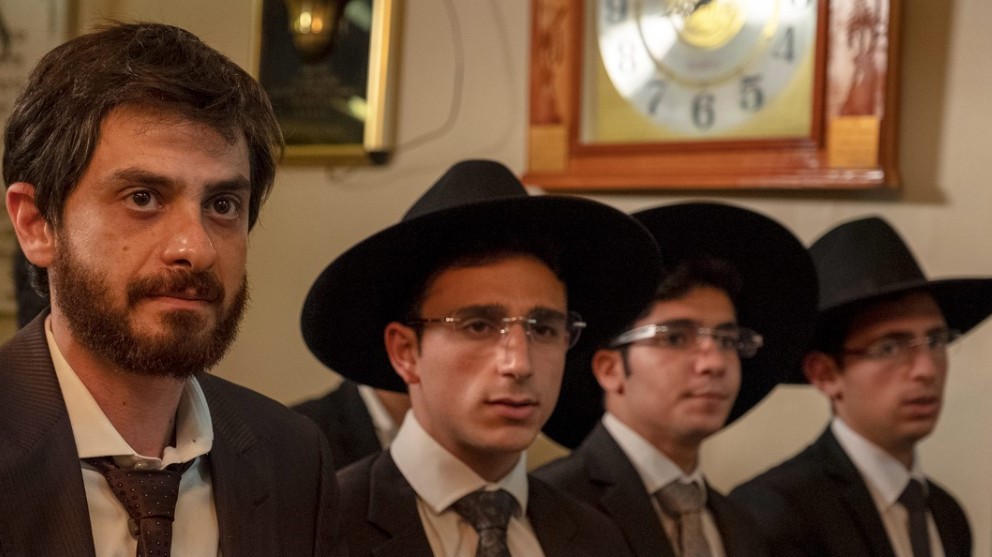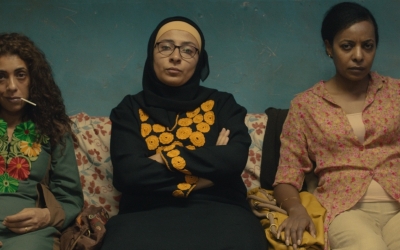Our Boys: Another story of Israel's superior morality

American Zionist cinematic efforts to represent the colonisation of Palestine as a "Jewish struggle for national liberation" scored a huge success with the 1960 film Exodus.
The film popularised the Zionist cause and remains inspirational to young American and European Zionists.
Exodus does not mention the conquest of the land of the Palestinians and the expulsion of the majority of the native population, as the native Palestinians are shown as nothing but a hateful obstacle to Jews attaining a homeland for them only.
Superior morality
A more recent cinematic project, which, though successful, did not have the same effect as Exodus, was the 2005 Steven Spielberg film Munich.
Stay informed with MEE's newsletters
Sign up to get the latest alerts, insights and analysis, starting with Turkey Unpacked
The film is concerned with the "soul" of Jews in Israel in the context of Golda Meir’s 1970s campaign to assassinate Palestinian intellectuals across Europe as retribution for the attack on Israeli athletes at the 1972 Munich Olympics.
As I argued in my review of the film, in focusing on the superior morality of Jews, Munich does not deviate much from Israeli propaganda, which claims that Jewish soldiers "shoot and cry".
The fact that Palestinian violence was always in response to Zionist conquest and murder is immaterial to Munich’s reasoning
The fact that Palestinian violence was always in response to Zionist conquest and murder is immaterial to Munich’s reasoning.
The Israeli air force bombing of Palestinian refugee camps in Lebanon and Syria, which killed hundreds of Palestinian refugees immediately following the murder of the Israeli athletes, makes no appearance in the film, and seems not to threaten the soul of Israeli Jews.
Munich wonders whether the policy of terrorism against individual Palestinians that Meir unleashed might have been misguided, but it insists that it was the Palestinians who forced the choice of terror on Israel. Munich’s point is that because Jews have a morally superior code, Israel should not have responded to the Palestinians in kind.
Our Boys
This is precisely the underlying premise of the new Israeli-HBO series co-production Our Boys that recently aired on HBO and on channel 12 in Israel. The series begins with the June 2014 abduction and killing of three Israeli Jewish teenage colonial settlers in the West Bank, by two Palestinian men, who, though members of Hamas, acted on their own.
We do not learn much about the abduction of the teenagers, whose status as settlers is scarcely mentioned
We do not learn much about the abduction of the teenagers, whose status as settlers is scarcely mentioned, as their kidnappers are identified simply as Palestinians. The latter are not named until the last episode, when we learn that the Israeli army shot them dead and bulldozed their families’ homes.
But we learn nothing of the reasons why the two Palestinian men kidnapped the three teenage settlers, let alone their background stories, or of their families who live in Al-Khalil (Hebron) and their struggles under Israeli occupation and the violence of Jewish colonial settlers.
The Israeli campaign that ensued after the kidnapping led to Israeli army raids on 1300 Palestinian homes and businesses, the arrest of more than 800 Palestinians and the killing of nine. But all of this is of no interest to Our Boys, which focuses on the agony of the Israeli Jewish public.
It is in the wake of the discovery that the three teenagers had been killed, and the ensuing Jewish popular violence in the streets of Jerusalem and elsewhere against Palestinian civilians, that the story of the “revenge” killing and burning alive of the Palestinian 16-year-old boy Mohammad Abu Khdeir by three Jewish settlers (two teenage cousins and their uncle) unfolds.
The revenge abduction
The story of the three murdered teenagers hovers over the series as the primary cause of everything that unfolds. The series agonises over the grizzly revenge abduction of the Palestinian boy, who was standing in front of his home when he was kidnapped and strangled by the two Jewish boys, and then beaten up with a crowbar by their uncle who set him on fire while he was still alive.
The series’ agony and that of the Israeli public is that this could not have been a crime committed by Jews, for if Jews had committed it, the souls and morality of Israeli Jews would be compromised.
We do not see the Abu Khdeirs’ family life, except in the context of mourning with nameless Palestinians coming to offer condolences
We are treated to every humanising detail about the Jewish terrorists. We see the uncle play guitar and sing to his daughter, care about his nephews, battle feelings of inadequacy with his father (a Mizrahi rabbi who has his own yeshiva), care for his ailing mother, having Sabbath dinner, smoking with his nephews in the backyard of his home, built on stolen Palestinian land in a Jewish colonial settlement in the West Bank.
We even find out that he moved there, not out of Zionist ideology, which motivates right-wing Ashkenazi colonial settlers, but because of low housing costs.
We also see the teenage nephews in their family settings. The youngest stutters and is emotionally burdened by his Orthodox parents’ expectations that he attend yeshiva. We see him battle feelings of guilt and desperation that he expresses in therapy sessions with an Ashkenazi therapist who caters to the Orthodox community.
These are concerns and problems that are shared with the Orthodox Shabak (Israel’s secret police) detective who solves the case. He is also of Moroccan Jewish Orthodox background, and feels guilt about caring for his aging mother and her expectations, and over his Orthodox brother and his expectations.
Dehumanising the Palestinians
None of these humanising scenes is reserved for the Palestinians who murdered the Jewish teenage settlers. Indeed, the only Palestinians deserving a fraction of these humanising scenes are Abu Khdeir’s parents, but not his siblings, except for scant attention to his older brother.
We do not see the Abu Khdeirs’ family life, except in the context of mourning with nameless Palestinians coming to offer condolences.
The sympathy shown the Abu Khdeirs pales in comparison with that shown to the three Jewish terrorists and their families
We never see them sing, have dinner, or buy gifts for one another. We do, however, see them work for Jewish clients and bosses, and we see the struggle between the father and the young Mohammad Abu Khdeir, who was enamoured of a Syrian refugee girl in Istanbul with whom he obsessively texts on his phone, shirking work.
We learn that Mohammad likes line dancing, or dabkeh. But little time is dedicated to Mohammad besides this. Other Palestinians allowed to speak have no background stories, except for Abu Zuhdi, whose son was killed by the Israeli army and whose home was demolished as punishment for his resistance to the occupation.
Abu Zuhdi briefly narrates his story, but without scenes that humanise him or his family. Apart from this, Palestinians are often shown as a violent mob disrupting the peace of their Israeli-occupied city, declared the capital of Israel.
The series is triumphalist in its payment of lip service to objectivity by showing some aspects of Palestinian suffering and the Kafkaesque situation in which the Abu Khdeirs find themselves and the interrogations to which they are subjected.
Yet the sympathy shown the Abu Khdeirs pales in comparison with that shown to the three Jewish terrorists and their families, to whose torment and pain Our Boys dedicates most of its scenes.
Protesting the show
Still, the discrimination that Palestinians endure by the Israeli police, the security apparatus, the law, and the courts, is amply exposed. As a result it has garnered condemnation by Israelis, who wrote hundreds of letters to protest about the show, and by Israeli Prime Minister Benjamin Netanyahu, who labelled it "antisemitic" and called for a boycott of the Israeli channel showing it.
Palestinians are often shown as a violent mob disrupting the peace of their Israeli-occupied city, declared the capital of Israel
The murder of the Israeli teenagers instigated Israel’s attack on Gaza in the summer of 2014, resulting in the murder of 2251 Palestinians, including at least 551 children, and the injury of 11,231 Palestinians, including 3436 children.
Our Boys shows how the bombing of Gaza was covered on Israeli TV en passant, without details. Indeed, a day before Mohammad’s murder, Israeli MP Ayelet Shaked called for genocide against the Palestinian people on Facebook, a statement that garnered thousands of likes.
She became Israel’s justice minister less than a year later. These events do not seem to undermine Israeli morality as far as the series is concerned.
But the moral of the story that Our Boys wants to tell is that Palestinians who do not resist Israeli racism and colonialism and who work with Jews or for them (Mohammad himself worked at a Jewish-owned restaurant) do not deserve to have their son burned alive, as this compromises Jewish moral superiority and endangers the souls of Israeli Jews.
An ideological agenda
Palestinians who resist Israel, however, seem to deserve to be burned alive with Israeli bombs without any threat to Israel’s superior morality. Indeed, the series, titled Ha-Ne’arim in Hebrew, meaning young men, and awkwardly translated to Arabic as Fityan, is rendered in English as Our Boys, where the possessive pronoun refers to Israel.
The English title betrays the ideological agenda of the show’s producers (not one of them is a Palestinian) and of its three Israeli directors, one of whom is a Palestinian citizen of Israel, the other an Ashkenazi Jewish Israeli, and the third an American Jewish settler who came from New York with his Orthodox family when he was five.
At the end of the show, Israel’s superior moral principles and its Jewish souls are victorious, on account of the court’s indictment of the three Jewish terrorists, even if the court refused to grant the Abu Khdeirs’ request to demolish their homes as Israel does with Palestinian “terrorists”.
This aside, Our Boys, like the film Munich, does not tire of reminding us that the threat to Israel’s superior morality and its Jewish soul comes from the resisting and violent Palestinians, and not from Israeli colonial conquests, military occupation and institutionalised racism.
In doing so, Our Boys follows in the footsteps of Golda Meir’s racist statement which summarises perfectly the main point of the series: “We can forgive you for killing our sons. But we will never forgive you for making us kill yours."
The views expressed in this article belong to the author and do not necessarily reflect the editorial policy of Middle East Eye.
This article is available in French on Middle East Eye French edition.
Middle East Eye delivers independent and unrivalled coverage and analysis of the Middle East, North Africa and beyond. To learn more about republishing this content and the associated fees, please fill out this form. More about MEE can be found here.








